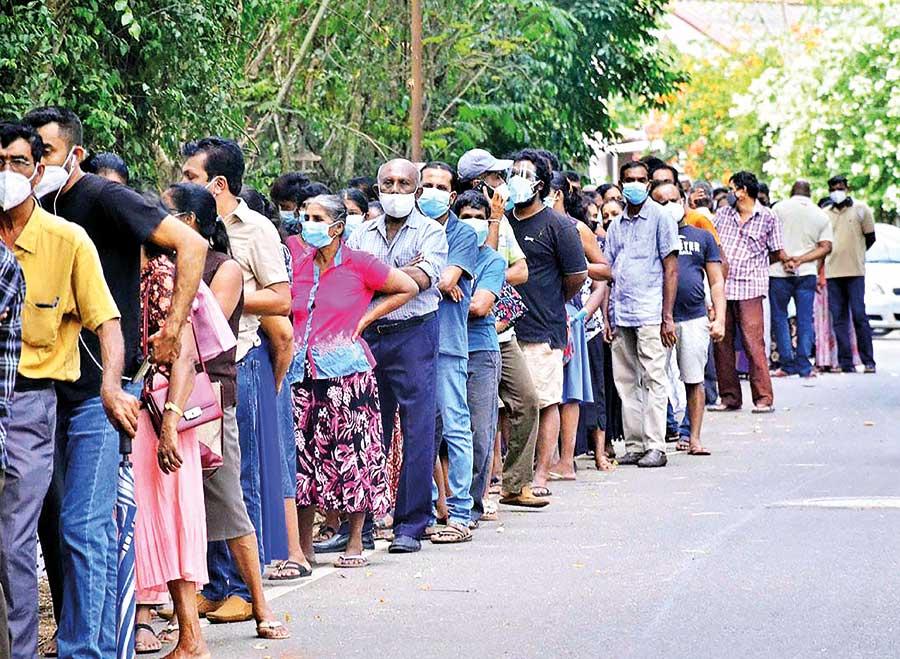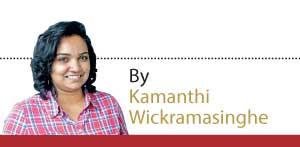Reply To:
Name - Reply Comment

People queuing up at vaccination drives in Colombo
The much awaited vaccination drive for Sri Lankan healthcare staff began on January 29. The National Advisory Committee on Communicable Diseases (NACCD) also listed out four high risk groups including frontline healthcare workers, security personnel, people with cormobid diseases and other essential groups. However, with the Health Ministry’s recent announcement that the vaccine is available to the public, many people seem to be queueing up at designated vaccination centres to get the jab. But medical experts opine that vaccinating the 30-60 age group doesn’t have a scientific basis and warns that the local vaccine supplies are quickly
Advisory Committee on Communicable Diseases (NACCD) also listed out four high risk groups including frontline healthcare workers, security personnel, people with cormobid diseases and other essential groups. However, with the Health Ministry’s recent announcement that the vaccine is available to the public, many people seem to be queueing up at designated vaccination centres to get the jab. But medical experts opine that vaccinating the 30-60 age group doesn’t have a scientific basis and warns that the local vaccine supplies are quickly
running out.
Govt. violating own protocol
“The Government agreed with people on a protocol and said that there are four groups of people who need the vaccination,” opined Consultant Community Physician Dr. Ruvaiz Haniffa. “They include frontline healthcare workers, security personnel, those with comorbid diseases and other essential people. But now they are violating their own protocols. It’s alright to give it to people, but there has to be a proper plan. The vaccine is given to protect oneself against severe illness” said Dr.Haniffa.
When asked if people need to stick to safety precautions even after the vaccine is given, Dr. Haniffa responded in the affirmative. “You need to follow the Swiss Cheese Model of COVID-19 defence. The final outcome of the vaccine is to decrease severity and prevent deaths from COVID,” explained Dr. Haniffa.
"Health experts want the Govt. to pay upfront in cash so that manufacturers prioritise Sri Lankan orders in the delivery queue, order from multiple manufacturers and order over 100% of requirements"
New variants will be more immune resistant
“Our vaccination strategy needs to be clear about its goals,” opined international medical researcher and Executive Director at Institute of Health Policy Dr. Ravindra Rannan-Eliya. “These need to be both: (1) minimising deaths and serious illness, and (2) minimising transmission, since our National COVID Strategy, whose goal is Elimination, has failed to achieve its objective. If we had been able to maintain elimination (which would have required an investment in testing which we never made), then we would have had the option of delaying vaccination a little bit.
“There are and will remain huge shortages in vaccine supplies through 2021–2022. Our analysis at IHP is that under the most optimistic scenarios under which all manufacturers deliver on their promised production targets, there is barely enough vaccines to cover everyone in the world by early 2022. The optimal strategy needs to take into account the significant risks of non-delivery or delayed delivery by manufacturers.” said Dr.Rannan-Eliya.
“But it can’t be justified why someone between the 30-60 age group should be vaccinated. It is not scientifically proven. There are only a limited amount of vaccines and the mortality rate is also increasing by the day”
Government Medical Officers’ Association Editor Dr. Haritha Aluthge
He also said that there is another problem that some vaccines might turn out not to be so effective against future variants that we may import in the future. “The best way to mitigate this risk is what other sensible countries are doing, including other developing countries, like Malaysia. That is to pay upfront in cash so that manufacturers prioritize Sri Lankan orders in the delivery queue, order from multiple manufacturers, and order over 100% of requirements to allow for likely delays and problems.”
“The strategy needs to take into account the probability that new variants will be more immune resistant. This requires two types of risk mitigation: (i) border restrictions to prevent import of new variants, and (ii) purchasing vaccines which are most likely to perform well against future variants. The Government appears to have given up on or is not taking seriously preventing the entry of new variants, including additional cases of B117 which is already in the community,” he added.
"Critics point out that the Government appears to have given up on or is not taking seriously the prevention of the entry of new variants"
Deviation from scientific priorities
The College of Community Physicians in a press communique mentioned that the key objective of the vaccination programme for COVID-19 across the globe is to minimize severe disease and thereby the deaths due to COVID-19. Prioritization is extremely important as there is a limited supply of COVID-19 vaccines across the globe (as indicated by the Vaccine Prioritization Framework of the Strategic Advisory Group of Experts on Immunization of the World Health Organization) and no clear timeline is available for the delivery of the required doses of the vaccine to countries. Thus, it is mandatory to use the available vaccines in the best way to optimize the outcomes to our country. Hence, the first priority as identified in National Vaccine Deployment Plan was to vaccinate the frontline healthcare workers and those who are directly involved in COVID-19 activities, which was completed in the first round of vaccination. The remaining priority groups includes those over 60 years of age and specifically those suffering from non-communicable diseases in which severe diseases and deaths are happening on a daily basis in the country.
“ The mechanism has been violated now. Now everybody is trying to get it. On the other hand the Ministry of Health says the vaccination will be given in hotspots, but there’s no criteria to determine a hotspot”
President of Government Medical Laboratory Technologists Association Ravi Kumudesh
The decision of the Ministry of Health to initiate vaccination targeting the individuals of 30 to 60 years was implemented in a few selected communities is a clear deviation from the scientifically agreed prioritization stated in the National Vaccine Deployment Plan. This strategy is neither an evidence based practice, nor a public health decision considering the wider public health and economic outcomes, and it totally derails the COVID-19 preventive activities in the country, dangerously undermining the public health response to COVID-19 especially with regard to the objective of reduction of complications and deaths due to COVID-19.
“Disregarding the recommendations of National Advisory Committee on Communicable Diseases (NACCD) at this stage of pandemic response may jeopardies the entire COVID-19 control activities. We, the CCPSL, earnestly requests the government to urgently implement the scientifically recommended vaccine priority list rather than taking ad hoc decisions on vaccination policy.
"It is mandatory to use the available vaccines in the best way to optimise the outcomes to the country"
Vaccine is the only weapon
“The mode of spread of new variants is similar to the virus already in Sri Lanka,” the Sri Lanka Medical Association stated. These new variants may have the ability to be more infectious and therefore will spread the infection more quickly among the community. When more people are infected, more patients will develop symptoms and complications and death. Same public health measures currently recommended namely wearing face masks correctly and consistently, social distancing (more than 1 meter), avoiding crowded places and taking sanitary measures (frequent hand washing) are equally effective in prevention of transmission of new variants and should be practiced at all times.”
“The alarming increase recently in the number of new cases is most probably due to the ignoring of these precautions. Vaccination is the only weapon available at present to bring the pandemic including the infection with new variants, under control. The vaccine currently in use adequately covers new mutants as well. Even the South African strain, not isolated in Sri Lanka so far, is known to be covered to a great extent by the vaccine. Therefore, when the vaccine is offered, it is BEST that all eligible, take the vaccine as it reduces the severity of the illness and prevent deaths. They may even reduce the transmission of the infection. There is no need to be anxious about the new mutants of the virus circulating at present. This statement has been released to make the public aware of the new variants of the COVID-19 and how best to act upon them,” the statement signed by Consultant Neurologist and President of SLMA Dr. Padma Gunarathne read .
“ You need to follow the Swiss Cheese Model of COVID-19 defence. The final outcome of the vaccine is to decrease severity and prevent deaths from COVID”
- Consultant Community Physician Dr. Ruvaiz Haniffa
The vaccine shouldn’t be a business
“There’s a discrepancy in the way in which vaccines are being given,” said Ravi Kumudesh, President of Government Medical Laboratory Technologists Association. “It was the high risk people, security personnel and frontline healthcare workers who were going to be vaccinated first. However, the mechanism has been violated now. Now everybody is trying to get it. On the other hand the Ministry of Health says the vaccination will be given in hotspots, but there’s no criteria to determine a hotspot. Any citizen has the right to demand the vaccine. However with the involvement of the private sector it will also compel people to pay and get the vaccine. This will again bring out the class difference as well. As such the State Pharmaceutical Corporation should have a regulatory price structure and should be the only institution to the distribution. This way irrespective of financial status, people will be able to purchase the vaccine. After all the vaccine shouldn’t be a business.” said Kumudesh.
“Our analysis at IHP is that under the most optimistic scenarios under which all manufacturers deliver on their promised production targets, there is barely enough vaccines to cover everyone in the world by early 2022”
Executive Director at Institute of Health Policy Dr. Ravindra Rannan-Eliya
supply running out
Government Medical Officers’ Association Editor Dr. Haritha Aluthge said that a vaccine deployment plan was released on January 15. “With that a National Advisory Committee on Communicable Diseases was also established. But now everybody is asking where they could get the vaccine. The AstraZeneca vaccine has 70-80% efficacy. The vaccine is given to reduce mortality and complications. As per the National vaccine deployment plan only high risk individuals were initially entitled to get the vaccine. But it can’t be justified why someone between the 30-60 age group should be vaccinated. It is not scientifically proven. There are only a limited amount of vaccines and the mortality rate is also increasing by the day. Now the public is lost. I see people queueing up with their IDs to get the vaccine.” said Dr. Aluthge.
When asked if Sri Lanka is running out of vaccines Dr. Aluthge responded in the affirmative while adding that it is quite uncertain as to when people would get their second doses. “We received 500,000 vaccines and out of them only 150,000 are remaining. Even though people in rural areas are being vaccinated they move about and the case load doesn’t reduce either.” he added.